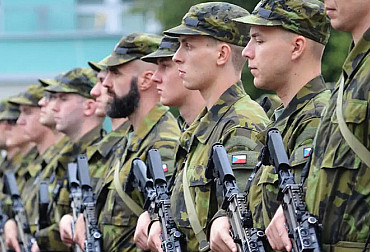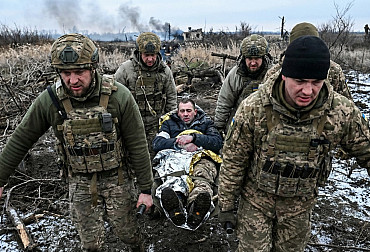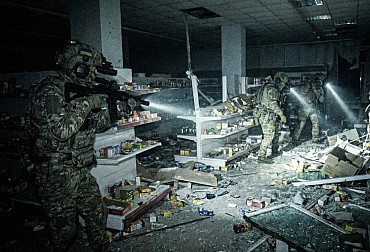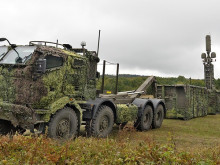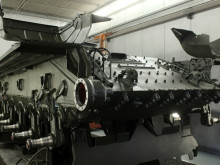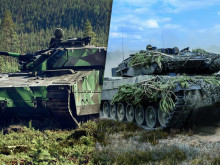Recruitment goals 2030 and the competitiveness of the Czech Armed Forces on the labour market - human resources must become a real priority
The Czech Army is still counting on an increase in the number of soldiers to 30,000 professionals and 10,000 soldiers in the active reserve by 2030, but at the same time it is well aware of the complexity of the problem it faces. Despite some improvements in the recruitment process, mainly brought about by the Virtual Recruitment Centre, the increase in the number of soldiers in recent years has been very slow, and unless there is a fundamental change in the approach and the development of the current situation, it is unlikely that the set goals will be achieved. And it is not just about overall numbers - the army desperately needs skilled personnel, without whom modernisation processes in the field of equipment and technology will remain largely without the desired effect.
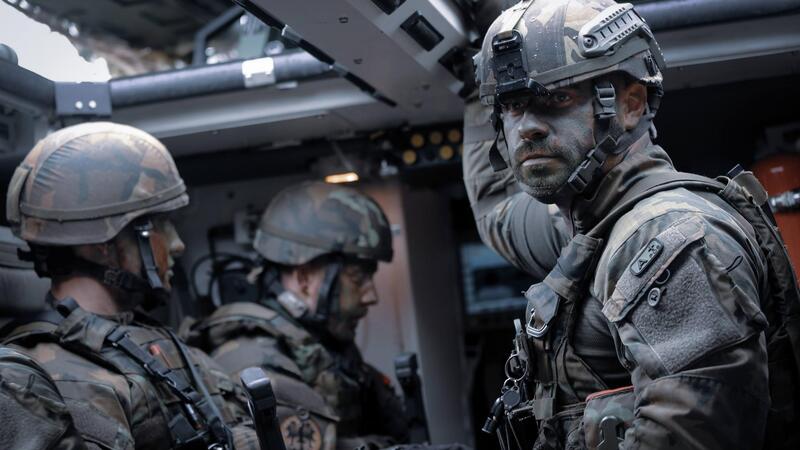
The Czech Army Construction Concept 2035, approved in December, confirms the aforementioned goals of 30 and 10 thousand soldiers by 2030 or takes over from the previous version of the ACR 2030 from 2019.At the same time, however, it does not hide the problem it generally assesses - among the weaknesses of the current state of affairs, the first place is given to "Low manning of the Czech Armed Forces, its age structure and limited possibilities of ensuring its sustainability," and among the threats, "Structurally and qualitatively unbalanced manning of the Czech Armed Forces." Investment in human capital development is also the first of the six strategic objectives of the new concept.
The KVAČR 2030 of 2019 states that to achieve the set goals, about 2,400 new soldiers should be added to the army annually, which should cover both departures from service and bring an annual increase of about 800-900 professional soldiers, which should result in about 7,000 soldiers between 2020 and 2030. And the active reserve should see a similar increase. However, the reality falls far short of this assumption. The latest published figures for 2022 indicate that there were just under 1 600 new soldiers, but due to the large number of service leavers, this represented an increase of just over 200. A recruitment target of 2,200 was set for 2023 (200 fewer than the average projected in the 2030 ACR).
At the beginning of this year, according to the Ministry of Defence, there were 27,826 professional soldiers in the armed forces, but this number also includes about 1,000 military police officers and about 1,500 members of the Military Intelligence Service. In order for the Czech Army alone to reach its planned strength of 30 000 soldiers by 2030, this means in practice the need for an annual increase of just under 800 professionals. Soldiers in the active reserve totalled 4,266 at the end of 2023 - and in their case, the army needs to recruit around 1,000 more per year over the next six years, compared to the compensation of those who will be leaving.
The average age of soldiers serving in the Czech Armed Forces is also a problem that is becoming more and more important, as it is now approaching 40 years, making the Czech army one of the oldest in the Alliance, or the second oldest after the Belgian army. "The average age of soldiers reflects the demographic development of society. As a modern and trustworthy organisation, the Army will maintain its competitiveness in the labour market despite unfavourable demographic developments, the deteriorating health and physical fitness of the population and the changing motivational priorities of the incoming generations. By changing the leadership approach, improving working conditions and environment, and accelerating and simplifying personnel processes, the ability to attract and retain specialists in narrow military specialties is enhanced. Recruiting and selection activities are simplified and accelerated through the use of data from government information systems. A virtual recruitment centre project is being developed. Recruitment of selected specialisations is supported by scholarship programmes."
The present tense of the quoted passage is due to the fact that it is a description of a desirable state of affairs, and it is questionable to what extent the average age of the soldiers of the Armed Forces actually corresponds to the demographic development of society. The population is ageing, that is unquestionable. According to the 2021 census, the average age in the Czech Republic was 42.7 years. According to Eurostat, the average age in the European Union was 44.5 years, and the population in Portugal, Spain, Greece, Slovakia, Italy and Ireland is ageing faster than in the Czech Republic, while Hungarians, Estonians, Bulgarians, Latvians, Lithuanians and Germans are also older on average than the Czechs. And yet the Czech Armed Forces are the second oldest army in NATO - so the problem clearly has multiple causes. For the sake of completeness, let's add that only the Baltic states, Finland, Greece, Norway and Denmark (and soon to be new member Sweden) have some form of compulsory attendance, which of course substantially reduces the average age of soldiers.
The key problem is the aforementioned competitiveness of the military in the labour market. And this is defined and strengthened primarily by the level of conditions under which the service is performed. The level of equipment, gear and armaments or the state of the immovable infrastructure obviously play an important role (a question of prestige and attractiveness of the profession), but far from being the primary one. The primary role seems to be, and this is not to be seen as pejorative or dishonest, the question of financial remuneration. Service in the army naturally and by definition entails significant limitations compared to civilian employment or entrepreneurship, and relying on other than financial motivation of soldiers to compensate for this fact cannot produce any results other than the current ones in terms of staffing the army. Even without listing and comparing specific figures, it is not difficult to estimate that, in terms of financial remuneration, the army today is, on average, at a level that cannot obtain more than a slight increase in the number of soldiers, a prospective stagnation or, in the worst case, even a decline in view of the aforementioned average age.
In November, the Parliamentary Committee on Defence, among other things, held an exit meeting in Vyškov. At that time, the State Secretary of the Ministry of Defence, Petr Vančura, spoke about the influence of territoriality, i.e. the ability and willingness to move a soldier across the country to the place of deployment, i.e. to the place where the army needs the soldier, and he also spoke about the financial valuation of soldiers who currently cover all living costs outside the army. For many, it is more attractive and more economical to take up civilian employment in their place of residence, even at the cost of a lower salary, than to serve in the army for a relatively higher salary, where they have to invest a significant part of that salary in balancing family life and service. The average gross wage in the Czech Republic in the third quarter of 2023 was CZK 42 658. The website doarmady.cz offers a freelancer a gross salary of CZK 37 310 and a housing allowance of CZK 3 000. And an interesting recruitment allowance of CZK 30-250 thousand. However, even in this respect, the market offers a number of competitive options, and if the army wants to succeed, it will probably have to reconsider these parameters as well. And we are still at the level of the average. As already mentioned, the army fundamentally needs to fill its ranks with experts who will be able to effectively use and maintain modern equipment and technology. However, this target group is more demanding and the labour market is very hungry for them.
The Chief of the General Staff, Lt. Gen. Karel Řehka said at the launch of the Virtual Recruitment Centre last September: "We always talk about the need for modernisation, we do it and it is right, but it is impossible to have quality equipment and not have quality personnel to go with it. We can't think we will be successful in multi-domain operations and warfare in the future unless we change the communication and recruiting system." General Řehka also mentioned the problems of recruiting new soldiers into the army and maintaining and growing the army to the required level in his speech at the recent Chief of Army Staff's Commanders' Meeting. The communication system is undoubtedly important and the Virtual Recruiting Centre is a rational to non-alternative step. If the Army wants to reach out to young people, it must do so through means that these people understand. However, the form of communication alone cannot lead to success.
The Ministry of Defence's budget for 2024 amounts to CZK 151.2 billion, with 30% going to investment (CZK 72.5 billion). This is a desirable step, not only in view of today's deteriorating security situation. The army needs to get rid of its remaining dependence on Russian equipment and modernise its weapons and equipment. However, the question is whether we are pursuing a balanced approach - that is, whether, alongside massive and growing investment in 'hardware', we are also seeing genuine and adequately growing investment in people, which the army repeatedly identifies as its priority. For 2023, the personnel costs for 28 134 professional soldiers (table places) amounted to 19.4 billion crowns. In the 2024 budget we see 29 234 professional soldiers (table places), but the personnel costs are only 15.8 billion crowns.
"I am glad that I have managed to ensure that the soldiers' salaries will not be reduced. We have an agreement with the finance ministry that the funds will be left for us to meet recruitment targets," Defence Minister Jana Černochová said last December. The realities of the state budget and its priorities and the realities of the defence budget and its priorities are one thing, but we must also take into account another fact, namely that, given the high inflation rate over the past year, the aforementioned freeze on soldiers' salaries actually means that, however much it is presented as a significant success, the current financial valuation of soldiers will not significantly boost interest in the service - on the contrary, it may cause an even higher rate of departures from the service. The army needs top-notch experts to operate top-notch equipment. However, if it does not offer them appropriately competitive remuneration, it will only attract candidates for whom other motivations are crucial. Praise be to those for whom money is not the primary motivation in joining the Army, but it is difficult to count on having enough of it to achieve the recruitment goals. This situation threatens the recruitment goals of the Army, and in the overall view it also threatens the future effectiveness of our army. It would therefore be advisable to adjust not only the communication but also the overall approach to the issue. Soldiers and investment in human resources should become a real priority, because if we want to have the most modern equipment and technology, we must also have the best experts in the army.
Source: MoD of the Czech Republic, Obrana České republiky v číslech 2023, Defense Magazine, Obrana České republiky v číslech 2024, ČTK, Český rozhlas











